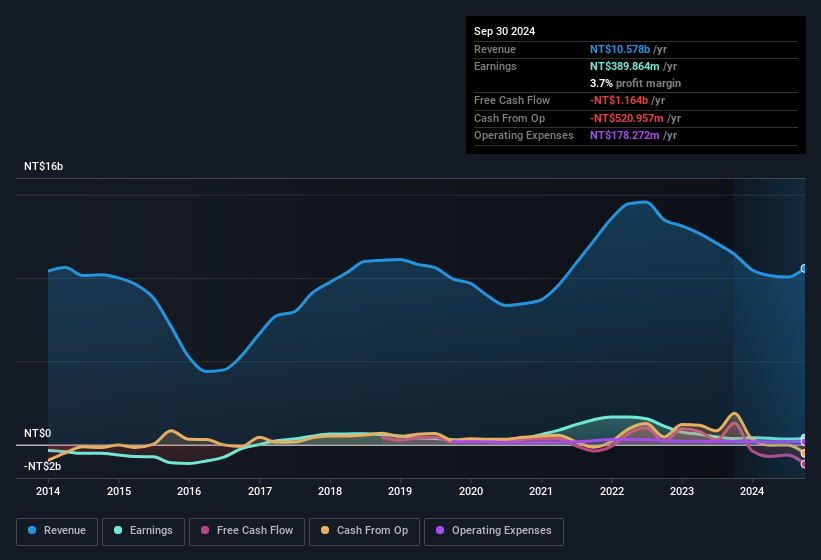- Taiwan
- /
- Metals and Mining
- /
- TWSE:2028
Wei Chih Steel Industrial (TWSE:2028) Strong Profits May Be Masking Some Underlying Issues
Wei Chih Steel Industrial Co., Ltd.'s (TWSE:2028 ) stock didn't jump after it announced some healthy earnings. We think that investors might be worried about some concerning underlying factors.
View our latest analysis for Wei Chih Steel Industrial

A Closer Look At Wei Chih Steel Industrial's Earnings
Many investors haven't heard of the accrual ratio from cashflow, but it is actually a useful measure of how well a company's profit is backed up by free cash flow (FCF) during a given period. To get the accrual ratio we first subtract FCF from profit for a period, and then divide that number by the average operating assets for the period. The ratio shows us how much a company's profit exceeds its FCF.
That means a negative accrual ratio is a good thing, because it shows that the company is bringing in more free cash flow than its profit would suggest. While it's not a problem to have a positive accrual ratio, indicating a certain level of non-cash profits, a high accrual ratio is arguably a bad thing, because it indicates paper profits are not matched by cash flow. Notably, there is some academic evidence that suggests that a high accrual ratio is a bad sign for near-term profits, generally speaking.
Over the twelve months to September 2024, Wei Chih Steel Industrial recorded an accrual ratio of 0.22. We can therefore deduce that its free cash flow fell well short of covering its statutory profit. In the last twelve months it actually had negative free cash flow, with an outflow of NT$1.2b despite its profit of NT$389.9m, mentioned above. We saw that FCF was NT$1.3b a year ago though, so Wei Chih Steel Industrial has at least been able to generate positive FCF in the past. The good news for shareholders is that Wei Chih Steel Industrial's accrual ratio was much better last year, so this year's poor reading might simply be a case of a short term mismatch between profit and FCF. As a result, some shareholders may be looking for stronger cash conversion in the current year.
Note: we always recommend investors check balance sheet strength. Click here to be taken to our balance sheet analysis of Wei Chih Steel Industrial.
Our Take On Wei Chih Steel Industrial's Profit Performance
Wei Chih Steel Industrial's accrual ratio for the last twelve months signifies cash conversion is less than ideal, which is a negative when it comes to our view of its earnings. Therefore, it seems possible to us that Wei Chih Steel Industrial's true underlying earnings power is actually less than its statutory profit. But at least holders can take some solace from the 5.4% EPS growth in the last year. The goal of this article has been to assess how well we can rely on the statutory earnings to reflect the company's potential, but there is plenty more to consider. Keep in mind, when it comes to analysing a stock it's worth noting the risks involved. For instance, we've identified 3 warning signs for Wei Chih Steel Industrial (2 can't be ignored) you should be familiar with.
Today we've zoomed in on a single data point to better understand the nature of Wei Chih Steel Industrial's profit. But there is always more to discover if you are capable of focussing your mind on minutiae. For example, many people consider a high return on equity as an indication of favorable business economics, while others like to 'follow the money' and search out stocks that insiders are buying. So you may wish to see this free collection of companies boasting high return on equity, or this list of stocks with high insider ownership.
Valuation is complex, but we're here to simplify it.
Discover if Wei Chih Steel Industrial might be undervalued or overvalued with our detailed analysis, featuring fair value estimates, potential risks, dividends, insider trades, and its financial condition.
Access Free AnalysisHave feedback on this article? Concerned about the content? Get in touch with us directly. Alternatively, email editorial-team (at) simplywallst.com.
This article by Simply Wall St is general in nature. We provide commentary based on historical data and analyst forecasts only using an unbiased methodology and our articles are not intended to be financial advice. It does not constitute a recommendation to buy or sell any stock, and does not take account of your objectives, or your financial situation. We aim to bring you long-term focused analysis driven by fundamental data. Note that our analysis may not factor in the latest price-sensitive company announcements or qualitative material. Simply Wall St has no position in any stocks mentioned.
About TWSE:2028
Wei Chih Steel Industrial
Wei Chih Steel Industrial Co., Ltd. processing, manufactures and sells steel products in Taiwan, Australia, and internationally.
Excellent balance sheet with low risk.
Similar Companies
Market Insights
Community Narratives



